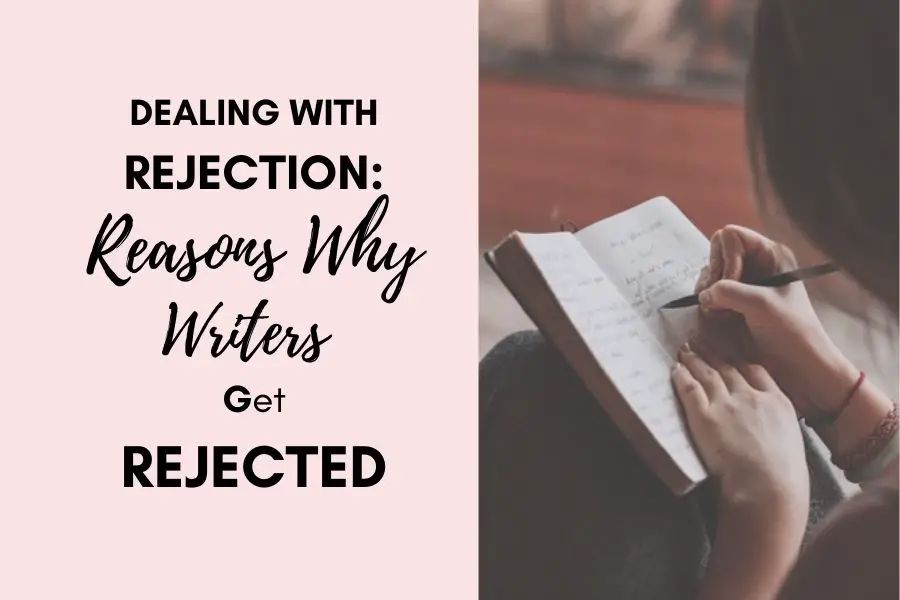Do you want to know how writers deal with rejection? Rejection is part and parcel of the path that every author has to deal with. No one is exempt from it.
You can say that it is a fiery crucible that can either discourage you or transform you into one of the best wordsmiths in history.
A Famous Writer’s Story of Rejection

Some might think that those who wrote literary masterpieces took the rosy road to best-seller stardom. But that is not the case for best-selling author J. K. Rowling.
You may not believe it but before she found her way to Harry Potter fame, she received a lot of criticisms and rejection before her famous book series got noticed.
Some rejections were only just a slip of paper without even having a chance to speak with the editor face to face.
In other instances, she received some of the most brutal critiques. One rejection letter even went on to suggest that she should take writing courses.
Fast-forward to today, and 12 publishers later—we can see the results of such scarring remarks on the beloved author.
She even goes on to encourage aspiring authors to keep trying. Sometimes we don’t see the battle scars of a well-decorated warrior with a pen.
Why Writers Get Rejected
Before you try to learn how writers deal with rejection, you also need to understand why you may have been rejected. You can say that it is the norm for writers to get rejected by publishers and editors.
There are several reasons why your work may get rejected—you’ll find a shortlist below. It will be a good idea to check if your work falls into any of these categories:
- The genre of your work may not be the right fit for the publisher.
- The story doesn’t take readers through emotionally powerful experiences.
- An overbearing theme, characters are one-dimensional and unrealistic.
- The first page of your manuscript is predictable or uninteresting (this can make or break your book in the eyes of the editor and the casual reader flipping through your work at the bookstore).
- A predictable plot, which becomes boring, lacks careful use of cliff hangers and plot twists
- Too few crisis moments in the story that makes things harder for the characters.
- Ingredients of a great story are missing such as a strong theme, a magnetic plot, interesting realistic and relatable characters, a strong author voice, and a captivating story world.
- Characters aren’t unique—readers may think that they’re rip-offs.
- High-level summaries are all over the place—it shouldn’t just be a summary or synopsis of your story but it should be designed to pique interest.
- The target audience isn’t clear.
- Poor spelling and grammar (yes, this happens).
Review your past work—the one that got rejected—and see if you have committed any of the mistakes mentioned in that list.
How to Deal With Rejection
You’re not the first author to get rejected, nevertheless, the feeling hurts terribly and on so many levels. One of the reasons why it hurts so much is that we human beings are social beings and we crave acceptance especially from our peers—well, in this case, it comes from editors, agents, and publishers.
Rejection is the only emotion that people experience that feels a lot like physical pain.
The good news is that there are ways to cope with and overcome the hurtful feelings that come with rejection. Sometimes it takes a change in perception and at times you need to understand the factors that led to that rejection.
The following are some of the best ways of handling rejection as a writer.
Tip #1–Realize That Your Writing is Not for Everyone
Every writer dealing with rejection should realize that there is no such thing as a one-size-fits-all rule for novels and books. Some publishers will like your work—a lot of them won’t.
Everybody goes through this phase from J. K. Rowling to Stephen King. The bottom line here: paradigm shifts heal the soul.
Tip #2–That Nudging Kernel of Truth
Criticism usually rubs against our pride as writers and nothing hurts more than when your work gets rejected and criticized. Sometimes the critique is aimed at you and your work, which is a double whammy of sorts.
Do we just swallow our pride?
The truth is that there is a thin line dividing healthy and unhealthy pride. On the one hand, it gives you self-confidence, a sense of well-being, self-worth, and assertiveness.
On the other, you have something that gives you that dog-headed unwillingness to realize that you messed up somewhere.
Sometimes the critiques have a nugget of wisdom that might just help usher you to writing fame and you’re just too stubborn to listen.
Tip #3–It’s Part of the Job

You also need to realize that dealing with rejection as a writer is part of the job. Don’t take it personally.
Guess what. The editors that rejected your work didn’t do it because they don’t like you. It’s just their job to screen all the literature that gets submitted to them. In fact, they are just following guidelines set by their boss.
Remember that you wanted to become a writer. That also means you embrace every facet of this lifestyle—including rejections and criticisms.
Tip #4–Get Back to Your Roots
Sometimes rejection and criticism make you hit rock bottom. When that happens, take a quick break.
But don’t just stop writing!
Take the time to go back to the very beginning, reflect on the reasons why you wanted to be a writer in the first place. At that point, you can call it quits and throw in the proverbial towel or get back up and keep fighting—or typing (i.e. writing) to be exact.
When you do decide to come back (and you should), take the time to read more, learn more, and write more. After some practice, come back to the rejection letter and address the proverbial elephant in the room.
Find out where things went wrong and fix it.
Tip #5–Get a Sense of Community
Dealing with rejection as a writer is crazy difficult especially when you’re on your own. The good news is that there are dozens of writing communities that can provide tips, support, and encouragement.
Here are some of those writer communities you can join on Facebook Groups:
- Ask a Book Editor
- 10 Minute Novelists Group
- Inner Circle Writers’ Group
- Writers Helping Writers
- The Write Life Community
- What’s Your Plan B?
- The Freelance Content Marketing Writer
These communities are excellent sources of inspiration, support, and tips, and tools that will help you grow in your chosen profession.
Tip #6–Try Self-Publishing

Self-publishing can help you get over the hurdles of traditional publishing companies. Amazon’s Kindle publishing has opened plenty of doors for budding writers. However, do take note that self-publishing has its own challenges since you’re going to do all the marketing on your own.
How Rejection Helps You Improve
Believe it or not, rejection can help you grow and improve as a writer. In fact, rejection might even make you a better writer. It helps you realize facts and develop important habits:
- It forces you to evaluate your ability as a writer
- It motivates you to do better
- It fortifies your inner-self so you can handle criticisms better
- Creates opportunities for personal and professional growth
- Teaches you to persevere
- Improves your patience
Understanding the how and the why will help you on how to handle rejection as a writer. Think of it as a rite of passage. The greatest writers have been through the same thorny path. There is no royal road to writing greatness and it is your privilege to bear the scars that lead to best-sellers.

You may also like:

